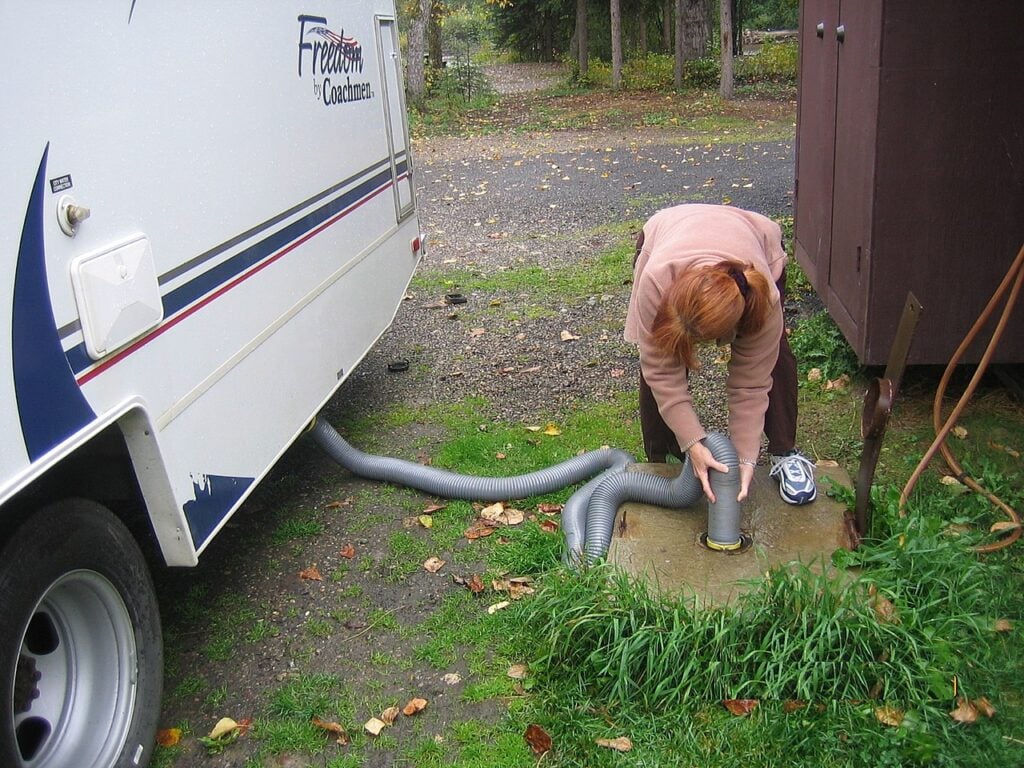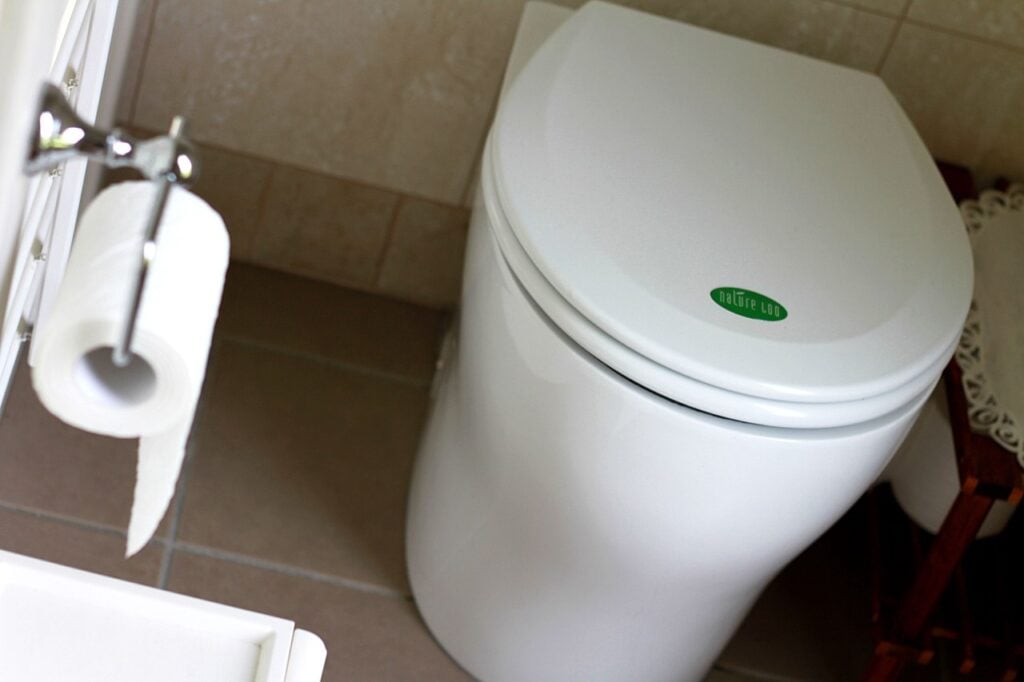No one really enjoys thinking about the sewage holding tanks in RVs, but everyone is aware of them when they are not acting properly. A lot has been written on the proper day-to-day maintenance and options for RV black tanks, but have you given much thought as to what happens after you dump those tanks?

RV dump stations aren’t the end of the waste story. What you use in your system can impact the ability for the waste to break down after it is out of your RV. (Photo by Mandruss, Wikipedia)
Mandruss, CC BY-SA 3.0, via Wikimedia Commons
Many dump stations, particularly in rural areas where connections to municipal sewer systems are not available, are effective septic systems. These systems contain a septic tank and an absorption field or leach field. The septic tank separates solids from liquids and begins the breakdown of material through bacteria and microbes naturally present in the wastewater. The leach field continues to treat the liquid wastes through physical, and biological processes before absorbing into the surrounding soil.
What you may not realize is that adding chemicals to your RV tank system can affect the ability for the dump stations to effectively treat the waste in them. Many cleaners and odor control products on the market contain chemicals like formaldehyde (or formalin) or para-dichlorobenzene (commonly found in urinal cakes and bowl fresheners) that are not only known carcinogens but can inhibit proper decomposition, produce toxic fumes, corrode pipelines, and pollute the soil and groundwater. These chemicals cause the bacteria in the septic treatment system to die, so the system cannot breakdown the waste.
An easy way to prevent chemical damage to dump stations is to know what is in the products you use by carefully reading the labels.
- Avoid products containing formalin or formaldehyde, para-dichlorobenzene, heavy metals (such as zinc), benzene, toluene, xylene, ethylene glycol (antifreeze), methylene chloride, 1,1,1-trichloroethane (TCA), perchloroethylene (PCE), sulfuric acid, and caustic soda.
- Never dispose of household chemicals, gasoline, motor oil, pesticides, paint, or antifreeze at dump stations.
- Clogging items such as cat litter (even the ones claiming to be flushable), coffee grounds, diapers, and grease should also not be disposed of at dumping stations.
There are a number of great alternative products on the market that do not use harsh chemicals to treat black tanks and control odor. Look for products that are biodegradable and septic-safe.
You might also want to investigate alternatives to having a black tank at all. Composting toilets do not require water (save it for another use) or a holding tank (so long dump stations!). It may seem initially weird to let your waste sit around composting rather than flushing it away, but since they separate liquids from solids, it produces fewer odors.

Composting toilets don’t require water or a black water holding tank. They are easy to install and use. (Photo by Stranman, Wikipedia)
Stranman84, CC BY-SA 3.0, via Wikimedia Commons
Incinerating toilets are another waterless option. They use a special chamber to incinerate waste. They are a very low-maintenance system producing a small amount of ash and almost no odor. It takes about 10 minutes to incinerate urine, and about half an hour to reduce solid waste to ash. As you might imagine, incinerating toilets require electricity and/or propane to do their magic.
Considering that the reason we all enjoy getting out in our RVs is to enjoy the beauty of the natural world, taking some time to consider how we can keep the beauty of our natural resources safe for future enjoyment is a small price to pay.

Quit being cheap. When the black tank fills up, throw away the coach and buy another one. Works with ash trays in Ferraris…..
😂😱 right!
There are several Biosolutions which add bacteria into black and grey water tanks. Works well and will clean up any solids left.
When storing coach 1/4 tavk water and 1/4 cp of dawn liquid soap.
You know, most people don’t see that!
Did anyone else notice the lady dumping her tanks forgot to wear disposable gloves?
Not only no gloves but improper seal tight fitting. Most states require that fitting. Also. Ever had to fish a hose out because you let go and it snaked down the hole. Just saying.
If one dumps their tank correctly, gloves are not required. Just thoroughly wash hands after dumping , wrinsing and storing the flex hose.
Don’t leave the valves open with hose attached. Dump when tank is at 3/4. Other wise the blank tank will develope a waste pyramid and then it will be a challenge to clear and clean it. Another reason to leave the hose stored when camping, its a trip hazard, especially at night.
Rv’r for 25 yrs.
The 10 min. urine / 30 min. solid incineration time, can you tell me which product does that? I can’t find anything that low on time.
That was to be my next comment. GLOVES! GLOVES! GLOVES! Not a good way to give advise on dumping tanks!!
Thank you TC Wait for your well written and insightful comments about black water and holding tank issues. It’s a good reminder that once the tank is emptied some of the processes have just begun.
Thank you TC Wait for your well written and insightful comments about black water and holding tank issues. It’s a good reminder that once the tank is emptied some of the processes have just begun.
We had a messy problem caused by the people before us using a sewer plugging amount of wet wipes. Don’t care if they’re labeled “Flushable”, they’re not. Park ranger had to fish out the plug and clean up after our sewage backed out of the sewer drain. Wonder how those wet wipes even got through their hose.
Thank you for your article. Do you know of anywhere in Canada or USA to purchase an rv incinerating toilet?
Don’t use such a long and convoluted hose!
It says not to dispose of antifreeze in dumps….does that include RV antifreeze, and if you aren’t to dispose of it there, where are you to flush it to?
Question do you not rinse out your black tank after dumping ? Not all tissue is biodegradable as well as the wipes which NEVER should flushed !
Fresh water antifreeze to be used in the plumbing and although it ends up in gray and a little black water, it is ok to dump into normal sewer and or septic. Not Glycol based antifreeze. Read the label.
Adding bleach is not advisable because it kills the organics essential to composting the solids in the tank. The smell from the tank (mostly methane) is evidence that the solids are being digested by live bacteria.
Next time in the hardware store go over to the septic tank section and read the ingredients label in the septic tank chemicals.They are usually various kinds of live enzymes.
Enzymes are proteins that act as biological catalysts. Catalysts accelerate chemical reactions. The molecules that enzymes act on are called substrates, and the enzymes converts the substrates (poop) into different molecules known as products; methane and other organic and inorganic products.
The products (inorganic residuals) left in the black tank after the enzymes are done eating the organics (about 7 days at temperatures above 60 degrees – the smell stops) can be removed with detergents and soaps.
The chemical mechanism of detergents is different than that of enzymes. Detergents are inorganic, they chemically bond to both water and oils. Some alter the molecular surface tension (stickiness) of materials they contact, oils stick to the detergent molecules and release from the substrate, an electro-mechanical process. For the most part, the poop doesn’t decompose, it is suspended in a detergent solution.
So if you want a pristine black tank and protect the environment, put septic enzymes in it. After 7 days above 60 degrees add detergent, drive around to slosh the solution to decouple the inorganics from the tank surface then dump.
Bleach is counterproductive to anything that happens in the black tank and is harmful to septic systems Don’t do it.
Long been a fan of composting toilets. And you can make your own (simple) for less than $20, and urine diverters are not required in any, bought or DIY. What is a real extra in my book is you can make it look like a chair (or throne) with a lift up top then move it where you will – a curtain around it works as well as having it in a fixed space. Get a copy of Humanure for a really interesting read and instructions.